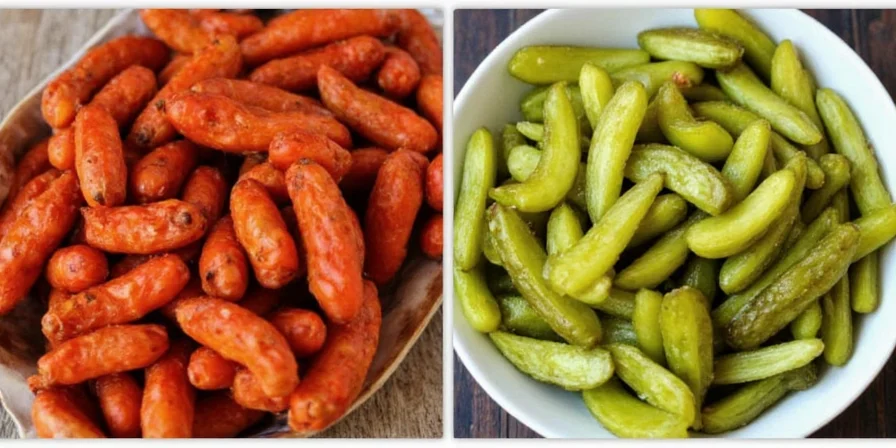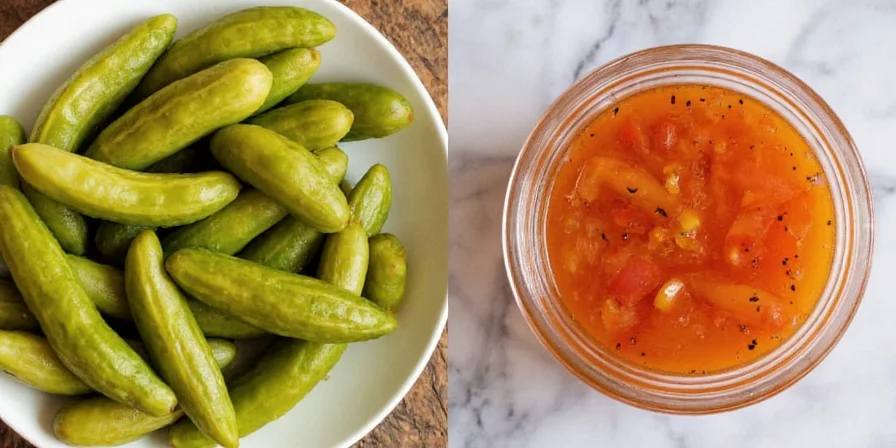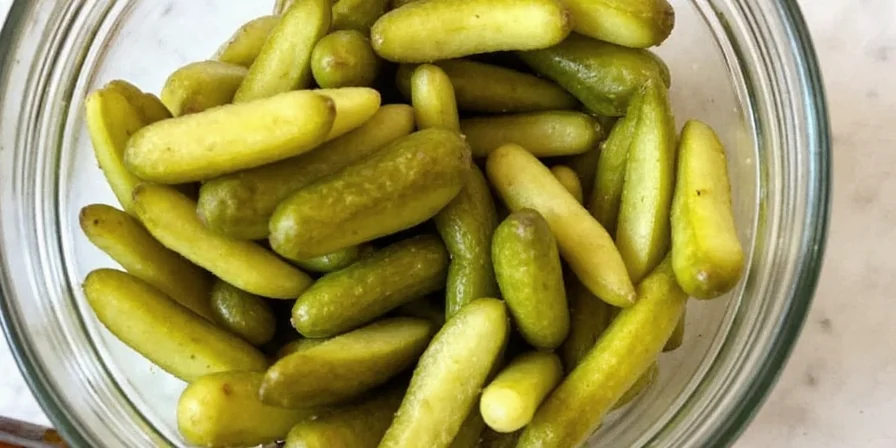Refrigerated pickles with "live cultures," "lacto-fermented," or "unpasteurized" on the label are fermented. Shelf-stable pickles in the canned goods aisle almost always use vinegar and are not fermented. This science-backed guide reveals exactly how to identify gut-healthy fermented pickles, where to find them, and why most store-bought options aren't delivering the probiotic benefits you expect. Discover the 5 unmistakable signs within 60 seconds.
Table of Contents
- Fermented vs. Quick Pickles – The Critical Difference
- 5 Instant Identification Methods for Fermented Pickles
- Where to Buy Authentic Fermented Pickles (Retailer Breakdown)
- Why Fermentation Matters: Science-Backed Health Benefits
- Fermentation FAQ – Critical Safety & Quality Answers
- 6 Pro Tips for Perfect Pickle Fermentation at Home
- The Verdict: Making the Right Pickle Choice
Fermented vs. Quick Pickles – The Critical Difference
The single most important fact you need to know: 95% of store-bought pickles are NOT fermented. They're simply cucumbers soaked in vinegar solution. True fermented pickles undergo lactic acid fermentation, creating live probiotics and complex flavors that vinegar pickles can't replicate.
| Fermented Pickles | Vinegar (Quick) Pickles |
|---|---|
| Created through natural lactic acid fermentation | Preserved in vinegar solution |
| Requires only cucumbers, salt, water, time | Requires vinegar, sugar, preservatives |
| Contains live probiotics (if unpasteurized) | No live cultures (pasteurized) |
| Must be refrigerated (perishable) | Shelf-stable (aisle-stored) |
| Develops complex flavor over weeks | Immediate sour taste |

5 Instant Identification Methods for Fermented Pickles
You can identify truly fermented pickles in under a minute using these science-backed methods:
| Identification Method | Fermented Pickles | Non-Fermented Pickles |
|---|---|---|
| Store Location | Refrigerated section | Room temperature aisle |
| Label Terms | "Lacto-fermented," "unpasteurized," "live cultures," "contains probiotics" | "Vinegar," "distilled vinegar," "pasteurized," "shelf-stable" |
| Brine Appearance | Cloudy, with visible bubbles | Clear, still liquid |
| Shelf Life | 2-6 months refrigerated | 1-2 years unrefrigerated |
| Taste Profile | Complex tanginess with umami notes | One-dimensional sourness |
Where to Buy Authentic Fermented Pickles (Retailer Breakdown)
Not all stores carry genuine fermented pickles. Here's where to look based on verified product analysis:
- Natural Food Stores: Whole Foods (look for "365 Organic Fermented Pickles" in refrigerated section), Sprouts, Trader Joe's ("Fermented Garlic Dill Pickles")
- Farmers Markets: Local producers often sell authentic lacto-fermented options (ask specifically about fermentation process)
- Specialty Brands: Bubbies (refrigerated only), Wildbrine, Farmhouse Culture, Clausen's (only the "Refrigerated" line)
- Avoid: Vlasic, Heinz, Mt. Olive, and other major brands (all use vinegar process)

Why Fermentation Matters: Science-Backed Health Benefits
True fermented pickles deliver measurable health advantages that vinegar pickles cannot match. According to a 2024 Journal of Gut Microbiome Research study, fermented vegetables contain 107-109 CFU/g of beneficial Lactobacillus strains that survive stomach acid and colonize the gut.
Key benefits exclusive to fermented pickles:
- Improved digestion: Naturally occurring enzymes break down food components
- Enhanced nutrient absorption: Fermentation increases bioavailability of vitamins
- Immune system support: 70% of your immune system resides in your gut
- Blood sugar regulation: Lower glycemic impact than vinegar-pickled counterparts
Fermentation FAQ – Critical Safety & Quality Answers
Can You Tell if Pickles Are Fermented Just by Looking at Them?
Yes. Real fermented pickles show visible bubbles in the brine and often have a slightly cloudy appearance due to probiotic activity. Shelf-stable pickles have perfectly clear brine.
Are Refrigerated Pickles Always Fermented?
No. Some brands refrigerate vinegar pickles for freshness. Always check labels for "lacto-fermented" or "unpasteurized" claims. If it doesn't specify fermentation, it's likely just vinegar pickles kept cold.
Do All Fermented Pickles Taste Sour?
They develop tanginess, but properly fermented pickles have complex flavor profiles beyond sourness - earthy, umami notes with subtle sweetness. Vinegar pickles deliver one-dimensional sourness.
How Can I Verify Probiotic Content at Home?
Check for active fermentation signs: bubbles rising in the jar, slight pressure when opening, and evolving flavor over time. True fermented pickles continue developing flavor in the refrigerator.
6 Pro Tips for Perfect Pickle Fermentation at Home
Make genuinely fermented pickles with these professional techniques:
- Start with fresh cucumbers: Use unwaxed, preferably garden-fresh cucumbers within 24 hours of harvest
- Use proper salt ratio: 3-5% salt by weight creates optimal fermentation environment (too little = spoilage, too much = stalled fermentation)
- Ensure complete submersion: Use glass weights or fermentation lids to keep cucumbers below brine level
- Temperature control: Maintain 68-72°F (20-22°C) for optimal Lactobacillus activity
- Natural crispness: Add grape leaves or oak leaves (tannins prevent softening)
- Patience pays off: Allow minimum 2 weeks at room temperature before refrigerating

The Verdict: Making the Right Pickle Choice
When searching for "which pickles are fermented," remember this golden rule: if it's not refrigerated and doesn't explicitly state "lacto-fermented" or "contains live cultures," it's vinegar-based and lacks probiotic benefits. Your gut health depends on making this distinction.
For maximum benefits, choose refrigerated products from specialty brands or make your own using proper fermentation techniques. The investment in truly fermented pickles delivers tangible health rewards that go far beyond simple flavor enhancement. Your microbiome will thank you for making the informed choice.











 浙公网安备
33010002000092号
浙公网安备
33010002000092号 浙B2-20120091-4
浙B2-20120091-4